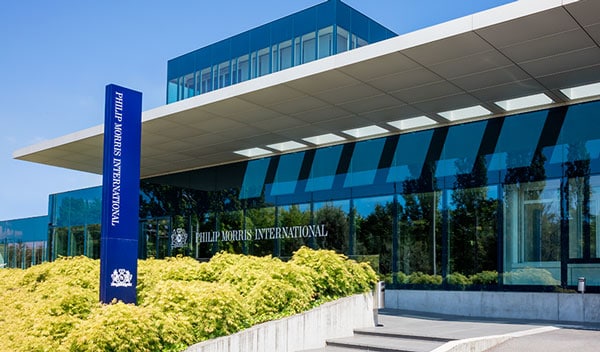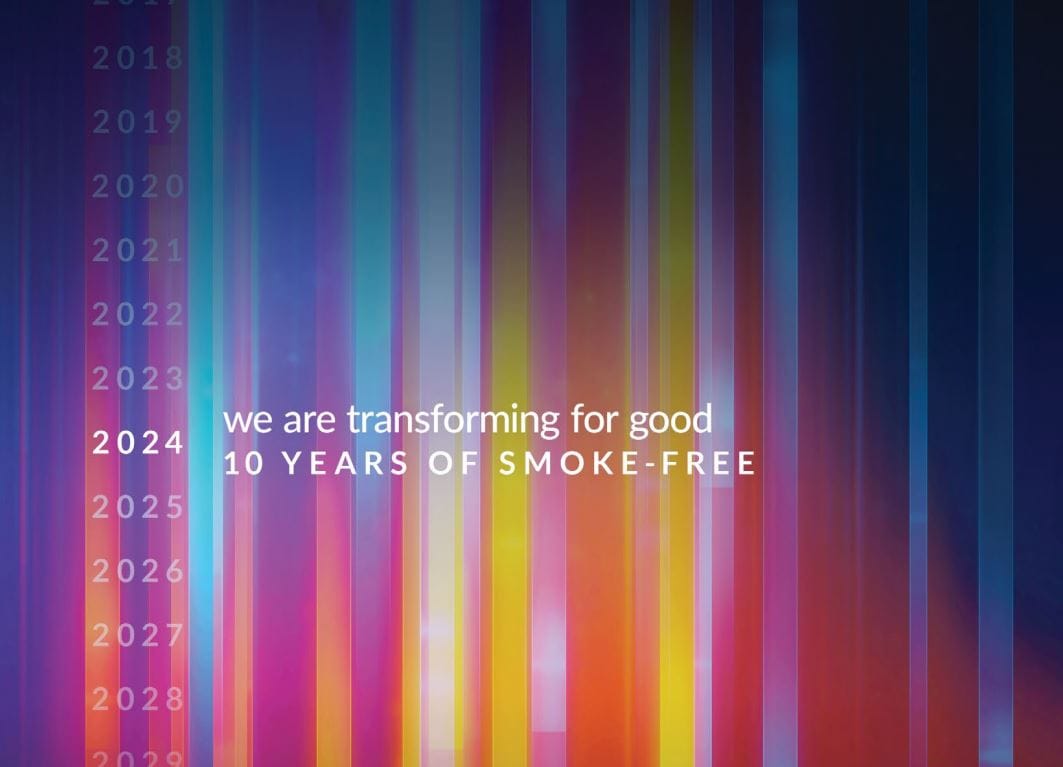We recognize that business transformation is a company-specific journey, which sustainability reporting standards and frameworks fail to adequately capture.
To make our progress toward achieving our purpose of becoming a smoke-free business both measurable and verifiable, we developed our Business Transformation Metrics, a bespoke set of financial and nonfinancial key performance indicators (KPIs). These metrics showcase how we are allocating resources away from our legacy business as we advance toward a future in which we will no longer base our success on making or selling cigarettes.

Our value chain transformation
Learn moreBy transparently reporting periodically on these KPIs—sharing both year-on-year and cumulative progress—we enable external scrutiny and allow our stakeholders to assess the pace and scale of our transformation.
For all our Business Transformation Metrics, we aim to report our historical performance, ensuring a consistent scope and calculation methodology, and we strive for external assurance. In 2024, 15 out of 16 Business Transformation Metrics were subject to external assurance by our independent auditor, PwC, confirming that our transformation is both measurable and verifiable (read PwC’s limited assurance report on pages 195-197 of PMI’s Integrated Report 2024).
The 2024 metrics marked with an asterisk (*) are subject to PwC’s Limited Assurance Report.
Note: Unless otherwise stated, all applicable business
transformation metrics include Swedish Match related data as of November 11, 2022 (acquisition date), as well as wellness and healthcare business.
1 Total PMI smoke-free users is defined as the sum of total IQOS users, total oral smokeless users, and total e-vapor users of PMI products minus poly-users across PMI's smoke-free product categories. 2022 and 2023 IQOS user data was restated.
For definitions, see Glossary.
2 Previously the metric was named "Estimated number of users who have switched to PMI smoke-free products and stopped
smoking (in millions)." The change pertains to name only. The methodology remains the same.
3 For definition of net revenues related to smoke-free, see Glossary.
Data excludes the impact related to termination of distribution arrangement in the Middle East in 2023.
4 For definition of available for sale, see Glossary.
5 Excluding PMI Global Travel Retail. World Bank report issued in 2021 is used on a comparative basis for income level classification. For definition of low- and middle-income markets, see Glossary.
6 Combustible tobacco products shipment volume includes cigarettes and other tobacco products expressed in cigarette equivalent units.
7 This indicator is calculated based on millions of units.
8 Direct
spend focuses on materials used in the manufacture of our products; it includes tobacco leaf, direct materials, and electronic devices and accessories. Data excludes Swedish Match and wellness and healthcare business.
9 Data reflect
the number of factories operated and owned by PMI at the end of the respective year. “Smoke-free products factories” is defined as manufacturing facilities producing heated tobacco units and oral nicotine products. The number of factories
reported is based on location, i.e., if a facility is one location, but has several physical areas (plants) the facility is counted as one.
Business transformation aspirations
Aspirations linked to our Business Transformation Metrics give us a clear roadmap. Early in our transformation journey, we set ambitious 2025 aspirations that grounded our purpose and gave direction to both our organization and external stakeholders as we ventured into what was then uncharted territory. Our commitment to champion a smoke-free future remains unwavering. However, nearly eight years since announcing our smoke-free vision, and with more data and a better understanding of the business environment, it was prudent to pause and revisit our aspirations as we look toward the next horizon: 2030.
We have undertaken significant business development activities in recent years. Most notably, we acquired Swedish Match in 2022. As the undisputed leader of the nicotine pouch category, Swedish Match fits squarely into our smoke-free strategy and is accretive to our growth. This means we are now fueling our transformation with two powerful engines: ZYN and IQOS. One key rationale for the combination was to enter the world’s largest smoke-free market of the U.S. ZYN is already well-established in the market, and we began consumer engagement pilots in 2024 to build awareness through category education through legal-age consumer engagement.
Since we started our journey with IQOS in 2014 with one device and two consumables, our portfolio has evolved and expanded. Our smoke-free portfolio now consists of three categories of tobacco and non-tobacco containing products, 19 different smoke-free (heat-not-burn and e-vapor) devices, and multiple consumables (notably 117 taste variants for PMI heated tobacco units).
As we fine-tune our strategy, our aspirations must also be able to account for challenges linked to uncontrollable factors—especially those related to the operating environment born primarily from policy and regulation (or lack thereof) in certain countries that directly influence our ability to communicate about or, in extreme cases, even commercialize our smoke-free products. Such challenges have directly contributed to a stronger-than-anticipated resilience of the combustible tobacco product business and thus influenced the pace of our transformation. Other, unforeseen challenges relate to the continued the ever-evolving geopolitical situation, and related global supply chain disruptions.
Against this backdrop, our priority in the short to medium term is to capitalize on our smoke-free products’ growth potential, including in the U.S. Accordingly, while we still believe in the natural fit and considerable potential that wellness and healthcare can bring to our business in the longer run, we recognize that more investment, research, and development are required before we generate meaningful incremental net revenues.
Our refreshed business transformation-related aspirations are as follows:
By 2030, we aim to be a substantially smoke-free business, with smoke-free products representing over two-thirds of our annual net revenues globally.
By 2030, we aspire for around 60 of our markets to have smoke-free products making up over 50 percent of our net revenues. Of these markets, we aim for 40 to derive more than 75 percent of their net revenues from smoke-free products and around 20 to derive between 50 and 75 percent of their net revenues from smoke-free products.
By the end of 2025, we remain committed to expanding the geographic availability of PMI’s smoke-free products to 100 markets, of which at least half are targeted to be low- and middle-income markets.
Moreover, in markets where our smoke-free products were available for sale[1] as of the end of 2024, our combustible tobacco product shipment volume decreased by more than 35 percent versus 2015, when our transformation had just started (and by 27.6 percent in all markets). If we continue on this trajectory, we expect that the growth of smoke-free products and consequent replacement of cigarettes will translate into a more than 50 percent decline of our combustible tobacco product shipment volume in these markets by 2030.
This online content about our Integrated Report should be read in conjunction with PMI’s Integrated Report 2024. This report includes metrics that are subject to uncertainties due to inherent limitations in the nature and methods for data collection and measurement. The precision of different collection and measurement techniques may also vary. This report includes data or information obtained from external sources or third parties. Unless otherwise indicated, the data contained herein cover our operations worldwide for the full calendar year 2024 or reflect the status as of December 31, 2024. Where not specified, data comes from PMI financials, nonfinancials, or estimates.
Unless explicitly stated, the data, information, and aspirations in this report do not incorporate PMI’s wellness and healthcare business, Aspeya. Regarding the Swedish Match acquisition, completed late 2022, unless otherwise indicated, this report includes information pertaining to its sustainability performance. Please also refer to "This report at a glance" on page 2 of the PMI’s Integrated Report 2024 for more information. Aspirational targets and goals do not constitute financial projections, and achievement of future results is subject to risks, uncertainties and inaccurate assumptions, as outlined in our forward-looking and cautionary statements on page 206. In PMI’s Integrated Report 2024 and in related communications, the terms “materiality,” “material,” and similar terms are defined in the referenced sustainability standards and are not meant to correspond to the concept of materiality under the U.S. securities laws and/or disclosures required by the U.S. Securities and Exchange Commission.



